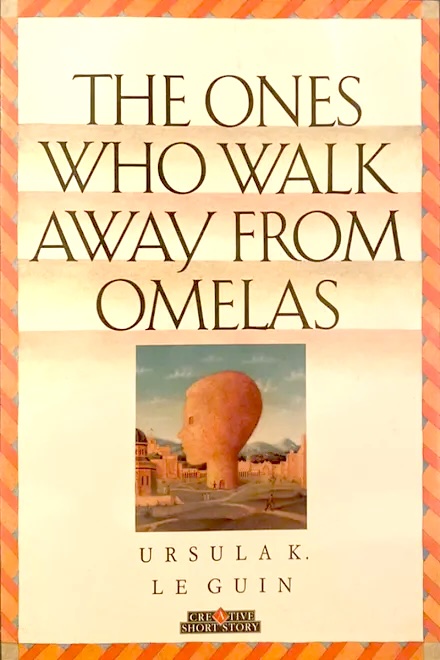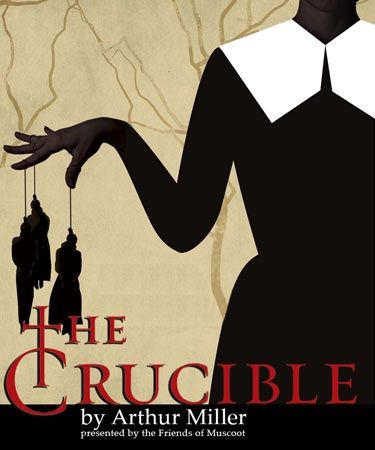In an Honors Fiction course I teach to high school students, we travel via literature to many places far removed from Denver, Colorado. Two literary destinations in particular remain with me.

- Ursula LeGuin introduces us to a city called Omelas in her short story “The Ones Who Walk Away from Omelas”.
- In The Crucible, Arthur Miller transports us to Salem, Massachusetts in a fictional examination of the Salem witch trials of 1693.
On the surface, Omelas looks inviting, nigh near perfect. And at first glance, Salem seems respectable, populated by church-going people of faith. But underneath the surface of both villages lies the uncomfortable truth. There is no place that is flawless. There are no people untouched by darkness.
In both literary works, the majority of citizens find themselves swept up in the “social contract” of the day. Omelans accept the reality of the vulnerable child in the core of their town, allowing “it” to suffer as they thrive. The child cannot be saved; the happiness of the entire city is dependent on its suffering. In Salem, a witch hunt commences. And most of the residents of Salem opt to point fingers to save themselves, sanctioning the mistreatment of the exposed and hypocritically allowing their faith to be manipulated.

1929-2018
LeGuin and Miller’s works, written decades ago, reflect their experiences of the day and their fears for the future. But I find myself feeling that Omelas and Salem aren’t all that different from the world we live in today. I am not that different from the citizens of these towns. I am often mute in the face of injustice, unwilling to risk my relative comfort in the face of fear and chaos. After all, going with the flow is always easier than taking a stand.

1915-2005
I read The Crucible and am stunned by John Proctor, the (problematic) tragic hero who goes to the gallows before besmirching his good name (or others who have been accused) — or Giles Corey, who was willing to die under stacked stones before putting another person in the court’s crosshairs. But I know full well that I would struggle to make their choices. My self-preservation instinct is strong.
And so, instead, I turn my eye to the Reverend John Hale. He rides into Salem with confidence bordering on arrogance. Summoned by the pastor in Salem, Hale travels from the town of Beverley, naively believing that he can ascertain the truth, sniff out the Devil, and bring healing to the village. He tosses fuel on the flickering flames with his interrogations and his blindness to the motivations of the accusers. He depends on metrics like church attendance and one’s ability to recite the Ten Commandments to reveal one’s righteousness (or lack thereof). Yet, eventually he does have the humility to acknowledge his misgivings, throwing his weight behind the accused — and against the prosecution — at a pivotal moment with his famous line: “I quit the court”.

His decision to stay in Salem after “changing sides” provides a contrast to those who find their way out of Omelas. LeGuin describes their departure simply: “They go on. They leave Omelas. They walk ahead into the darkness, and they do not come back.” They leave no words in their wake. They simply walk away from an injustice they are unable to stomach.They cannot accept their own comfort in light of the child’s discomfort.
He is my favorite character in The Crucible. Perhaps I admire Hale because I am often apt to simply avoid the truths that make me uncomfortable, often without saying a word. Perhaps I admire his willingness to acknowledge his mistakes because I so like to be right. But I think I admire him most for staying in a place of discomfort, advocating for others while acknowledging his part in the brokenness, and being present in their pain.
Hale stays. By doing so, he no doubt risks further damage to his reputation. He eventually challenges the court, argues against the rising tide of hypocrisy, even encouraging Salem’s best to lie, simply to save their lives. When he finally leaves Salem, he is a broken man.
Neither Hale nor the ones who walk away from Omelas change much — if anything — with their actions. The isolated child is still tortured and abused as the colorful and vibrant Omelas celebrates its summer festival. The witch hunt and the hangings in Salem continue — at least for a while. One could argue that Hale’s objections slow the process or stem the rising tide of hysteria in Salem. I’d like to think so.
But the real change occurs not in Salem but in Hale’s own heart. In acknowledging the grey spaces that he once saw as black and white, he becomes more human. I find that strangely heroic.
And where do these musings leave me? My corner of the world is comfortable, mostly; removed from fear, mostly. But the rest of my city, this country, and the world isn’t. And I’m left pondering the question that both Miller and LeGuin pose: what do I do in the face of injustice?
Do I protect my heart, practice self-care, and walk away from spaces that are hard to look at? Spaces that I honestly have little hope of changing? Do I opt out so that I can opt in elsewhere?
Or do I lean in and speak with my presence and my voice? Maybe even acknowledge some level of responsibility or complicity in the problem at hand?
And I wonder if “all of the above” is an acceptable answer.
Header Photo by Priscilla Du Preez 🇨🇦 on Unsplash


2 Responses
Illustratively insightful and invitingly vulnerable. Thank you!
Tami,
Thanks for this wonderful, personal reflection on two great stories. Wish I had thought to pair them when I taught!